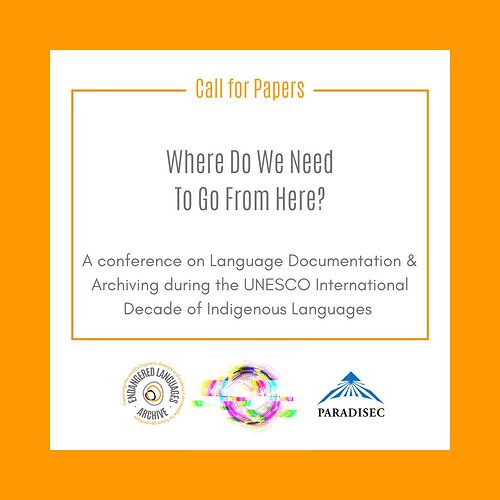Thanks @SarahDopierala for pointing this our way:
| event | date |
|---|---|
| Paper submission deadline | 2022-05-31T22:00:00Z |
| Notification of acceptance | 2022-07-31T22:00:00Z |
| Training and workshop dates | 2022-10-02T22:00:00Z→2022-10-04T22:00:00Z |
| Conference dates | 2022-10-04T22:00:00Z→2022-10-06T22:00:00Z |
Language documentation and archiving during the Decade of Indigenous Languages
05-07 October 2022
Jointly organised by ELAR and PARADISEC
2022 marks the beginning of the UNESCO International Decade of Indigenous Languages. The decade offers an important opportunity to join forces in the work of supporting Indigenous languages, to further develop practices and tools, and to extend and strengthen the networks we all rely on. Many lessons have been learned in the last 20 years of documentation and archiving, and all over the world activists, communities, researchers, and artists have developed documentation projects, apps, art installations, archival collections, films, and multimedia projects telling the many stories and histories of Indigenous languages and their creators and keepers. This conference brings together people working in this area to present papers, posters, and conduct training sessions aiming to develop capacity, present new approaches to documentation and preservation, and offer models of how we can create, strengthen, enhance, and amplify language records. The conference will create a platform to bring new ideas and views together, to share knowledge and to develop the agenda for the Decade.
We especially invite submissions on the following themes in language documentation and archiving:
Building Relationships:
- Models for building relationships and refining approaches for collaboration with indigenous communities
- Legacy collections: building relationships for discovery, preservation, and ethically-informed access
- Critical perspectives on language archiving: post- or neo- colonial?
- Identifying and responding to support needs and ethical considerations for improving the accessibility of language materials
- Language documentation practice as a medium for indigenous agency and revitalization
- Models for engaging and supporting indigenous communities in collaborative and community-driven documentation efforts
- How to work with differing expectations among speech community members
Tools and Techniques:
- Documentary tools and practices (e.g., remote methods, tools & methods for projects with specific foci, tools & workflows for managing collaborative projects, etc.)
- Indigenous ways of teaching & learning for documentation and language support
- Enhancing annotation practices: orthography, translation, ethnography, and ethics
- Improving tools to support the creation of archivable collections (e.g., ongoing software projects)
- Using social media and other technologies to support and promote minoritized languages
Planning and Design for the Decade:
- Reports from indigenous-led documentation, training, and revitalization projects
- Language archiving: current assessment and future prospects
- Approaches and solutions for making digital archives more navigable and engaging to indigenous communities
- Models for providing access where there is little or no internet access
- Engaging the broader public through artistic and educational initiatives drawing on archived language materials
- Revising OLAC metadata and other standards for accessible archiving
Impacts of Documentation and Archiving:
- Reports on how archived materials are being used by indigenous communities
- What insights into language have documentary methods provided?
- From paper to digital, the qualitative differences of language records
- Archives presentation/poster on what they have done over the past decade and what they plan on doing
See all the info at the easy chair submission page and the conference web page. ![]()
